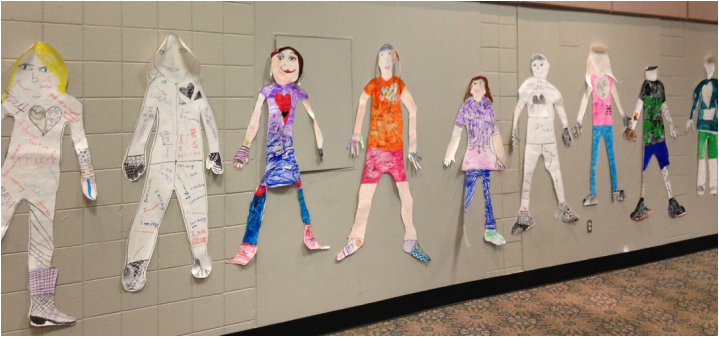Some gifted kids have, as psychologist, Dr. Edward Amend says, “a different perspective, creative thinking, and a unique sense of humor,” and that sometimes can alienate children and create rifts between peers when it’s misunderstood (Amend, Characteristics of Gifted Children: A Closer Look). Sometimes that sense of humor may isolate them, but it also can help them become class clowns, which may get them in trouble, but they gain points with their classmates who may or may not be gifted if they freak out their teachers or parents along the way.
For example, once my son, Joey had a crush on the student teacher who was assigned to teach his class (I think it was when he was in 2nd grade…) This is normally not a big deal, as many kids develop crushes on pretty teachers, but Joey had a teenaged brother who must have egged him on in less appropriate ways. So, Joey didn’t just have a crush on the teacher, but he gave her notes that said things that were inappropriate to the point that the teacher felt she had to call me again and again- “Today Joey gave the student teacher a note with his phone number on it, saying to call him if she wants to go on a date.” “Today Joey gave the student teacher a note saying he wants to kiss her.” “Today Joey gave the student teacher a note saying he wants to buy her a thong bathing suit and take her to the beach.” Yeah, that was my son… using his brilliant mind to cause trouble. His friends thought he was hilarious. So did his big brother.
It didn’t end there. In middle school I got phone calls from the PE teacher on a regular basis. He was failing PE. How does one possibly fail PE? Well, both of my middle children (Joey and his older sister,) managed to do that because they thought it was funny. Joey didn’t want to wear shorts when it was cold. He didn’t want to run laps. He didn’t want to hula hoop. Whatever it was they were supposed to do, Joey refused. Not because it was hard to do, or because he really cared either way- but because he thought the PE teacher’s accent was hilarious and he loved making him mad and hearing him revert to that accent and call me all upset and then make Joey get on the phone with me in front of all of his friends. I got really sick of hearing from both of them that year. But my office mates laughed every time I got a call- they came to look forward to them too. Joey was not scoring points with his teachers, but he certainly was amusing people around him.
And then there was the time he wanted to get out of going to his next class in middle school, so he called the 911 emergency number from his teacher’s desk phone. He said he didn’t think it would really dial, since you have to first dial “9” to make calls from inside the school. But yeah, it went through. And Joey ended up at home for the rest of the week on suspension for that one. His friends loved getting to mess around in the field while the fire department checked out the school, and they thought he was some kind of brave hero when they found out he was the one who called. They thought it was hilarious. Joey won again.
And another call I received from a teacher during his middle school years was when he did something inappropriate in science class. They were supposed to be playing charades- each team could write down science words on slips of paper, and the other team had to act them out. Joey wrote “boner” on a piece of paper. His teacher read it and immediately called me. He spent a couple more days at home for that one. He acted mad that the teacher would be upset- he said it was totally a science word and she should’ve set better parameters for the game if she didn’t mean ANY science word. So of course he scored major popularity points with that scenario. (We still have that discipline referral form somewhere- it was a classic one, we all were impressed the teacher really wrote the word “boner”.)
The problem was that Joey had a great sense of adult humor. But he was a child. And in order to keep a sense of order and not expose other children to material considered “inappropriate” for that age group, teachers had to censor my kid on a regular basis. And MY problem was, I had to keep a straight face while I was lecturing my son to not do whatever dumb thing he was doing at the time. In reality, the things he did and his arguments about why he shouldn’t be in trouble for them were really silly. He usually had a good excuse or argument, or at least he found a funny loophole. His intellect caused him to always see the grey areas- the ways the teachers failed to set the rules to prevent his actions, or the weaknesses of the punishment that usually ended up being more pleasant than following the rules (like getting to stay home for several days under “suspension.”) He was clever, and he saw school days as game time- he saw boundaries and rules as challenges. Just as many gifted kids do.
I’ve heard of gifted kids who have had similar disciplinary issues in the schools from drawing pictures of violent things or playing violently with sticks on the playground. Again, these kids think it’s funny, and often they are playing out things they have heard about or seen on television. There are a lot of things that smart kids pick up on that other kids don’t even notice. They ask a ton of questions at young ages and they know how to research things on their cell phones and are exposed to ideas and themes that less literate kids may never encounter.
Do you know or have a child who has an inappropriate sense of humor? Or maybe humor that is mis-timed and words come out in ways they don’t mean it or are interpreted wrong? Are they sarcastic and people think they are rude? Or are they passive aggressive in ways they think are funny but just make people frustrated?
Gifted children are wise beyond their years and often are exposed to things that parents of other children and teachers and other adults may think are not age-appropriate. It’s hard to keep our kids from being exposed to adult content when they read at adult reading-levels, or they are enamored with shows for their main content, such as the medical theme of the television show, Grey’s Anatomy (that my ten-year-old daughter currently is obsessed with… she wants to be a doctor, and she loves the characters… it just so happens they have sex scenes in every episode and she now has heard about more adult medical issues than I ever knew about, even at 20!)
It’s almost impossible to keep our bright children from learning “inappropriate” things. Even cartoons have sexual innuendos… movies are full of violence… video games and the internet expose them to new concepts that lead to new questions and Google searches. We can’t protect them from the world, but we can do our best to keep them from making fools out of themselves in public. Although, as my children have shown me over and over again, there’s only so much we can control. If they decide to use their knowledge and their humor to be the class clowns, they will not only do so, but they will be so good at it that we will get a lot of teacher phone calls and hopefully they will manage not to get kicked out of class too many times.
I am a teacher, and I understand the need to keep order in school. I understand the need to not expose other kids to “bad” things that their parents will freak out about. But I also recognize humor and see when a child is pushing buttons to get their friends to laugh, to get attention from the teachers, and get out of having to do work. Joey was great at avoiding work- he got out of going to school for days at a time.
It wasn’t going to work to hassle my Joey into behaving. What worked best with him was having a teacher who would laugh and tease him right back. “Oh, you want to be silly? Well, then I will laugh with you for a minute, express to you why you can’t do that in my classroom, and then give you an outlet for humor.” They could make him the class announcer in the mornings… make him a school yearbook photographer… encourage him to join theater classes where he can make everyone laugh in a more appropriate forum. But don’t yell at him or freak out about his attempts to shock you, and then hope he won’t do it again. Because he will do it more and more… every, single time.
One danger of gifted children being funny and acting out in ways that cause them to get in trouble in school is that they could lose their formal “gifted” eligibility in some programs. Often districts and states identify children as gifted only if they are high performing in academics. Children who stand out as trouble-makers may not be identified for gifted evaluation at all, or even if they are, they may be held as ineligible for services if they have disciplinary issues. Luckily some districts have processes set up to find gifted troublemakers, such as Pinellas County, Florida’s school district where students with disciplinary issues are screened for gifted characteristics and needs on a regular basis (https://www.districtadministration.com/article/how-schools-maximize-gifted-talent). But many schools and districts do not serve kids who have behavioral issues that distract them from the highest academic performance. Think about all the kids you know who seem really smart, but who play around at school and don’t reach their potential. Many of those kids could be gifted and under-served or not even identified.
Let’s face it, gifted kids have enough social challenges in their lives- trying to find other kids who understand them; trying to sit still in classes that they find excruciatingly boring; working in groups with other kids who aren’t as intense or who approach learning in different ways… They often use humor to lighten the mood and to connect with others. We need to help them find outlets for the need to be silly or to take the pressure off for a moment with laughter.
There’s definitely better ways for kids to get attention than to have the whole fire department show up at the school, or to constantly have power struggles with teachers. But if they don’t have other outlets for their silliness, or they feel inappropriate humor is their key to being “cool” with their classmates then we will see this happen more and more.
What we need to ensure is that our silly gifted kids have challenging and interesting things to apply themselves to each day, and teachers who understand gifted traits and can see past the silly stuff in order to encourage and serve them even when the kids are doing their best to distract everyone with their jokes. When learning is highly engaging and suits the personalities and needs of the students, inappropriate humor falls by the wayside as the children’s energy is absorbed in more appropriate ways. This takes extra planning time in some cases, and teachers may have to stay on their toes in order to keep shifting the discussions and pushing the kids to think even deeper. But it also takes a lot of effort to deal with class clown behaviors that disrupt learning.
And, although I did like knowing what was going on at school when I got my daily phone calls about Joey’s actions, I would have rather not had all that drama. There are better ways for parents and teachers to communicate on a regular basis about our little clowns, (and I’m sure there would have been much more engaging topics to discuss than how entertaining my child was when he pulled the fire alarm or wanted to buy his teacher a fancy bikini… thanks for the memories, Joey!)



 RSS Feed
RSS Feed
